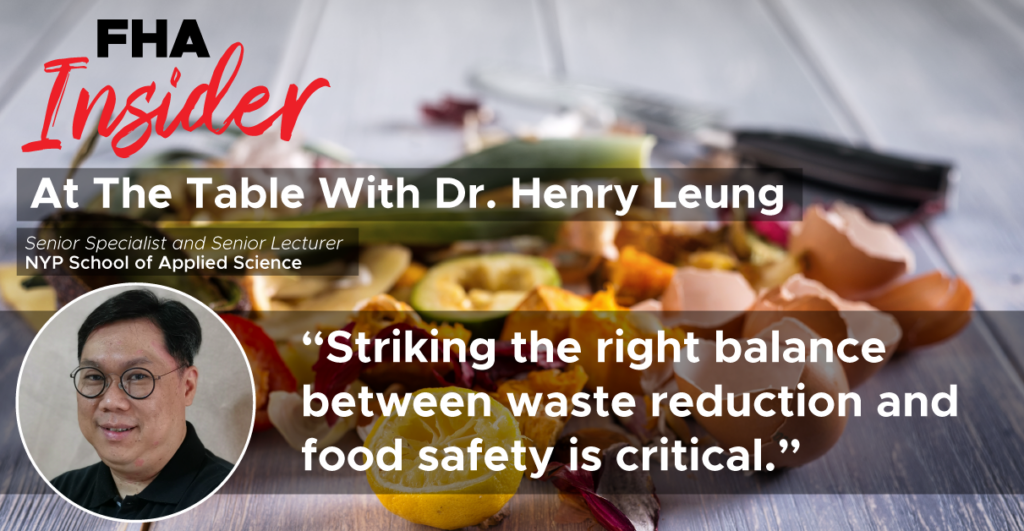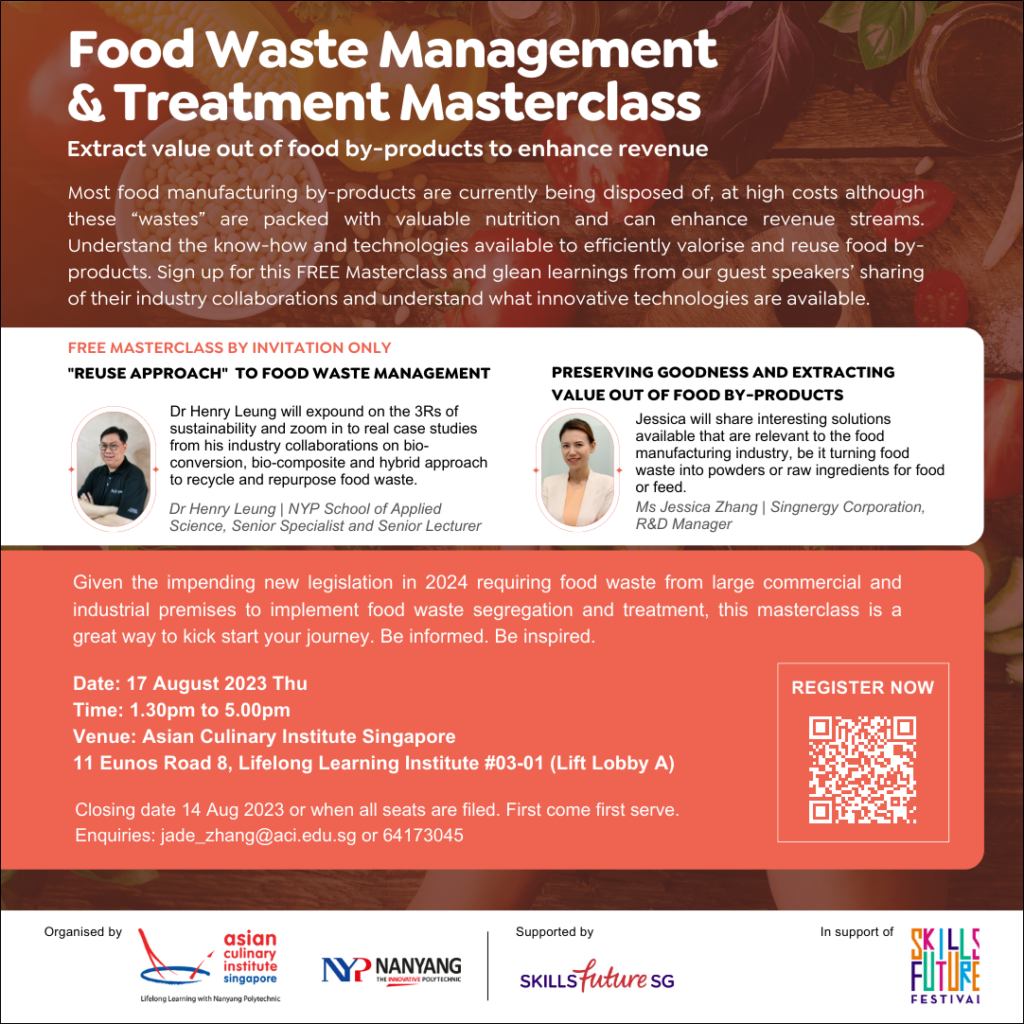
Food waste is one of the biggest waste streams in Singapore. The country generated 744,000 tonnes of food waste in 2019. Commercial and industrial enterprises contributed 40% of food waste generated each year.
To address the food waste problem, a new legislation under the Resource Sustainability Act will require food waste from large commercial and industrial premises to be segregated for treatment. Kicking in from 2024 onwards, the new legislation will apply to premises such as shopping malls, hotels, factories housing food manufacturers and food caterers involved in food preparation and processing.
We asked Dr. Henry Leung, Senior Specialist and Senior Lecturer from NYP School of Applied Science to share with us the challenges in food waste management and what food manufacturers can do to reduce waste.
Q: What is the biggest contributor to waste in food manufacturing?
The biggest contributor to waste in food manufacturing is often related to inefficiencies in the production process and the handling of raw materials, such as
- Defects: Defective products, misshapen items, or those that do not meet quality standards during manufacturing can result in waste.
- Spoilage: Finished products that spoil before they can be sold or consumed contribute significantly to waste.
- Loss during processing: Food processing can result in losses of edible portions, such as peels, trimmings, and by-products, which are often discarded.
- Excess packaging: This can lead to waste, particularly in terms of materials used and disposal.
- Inadequate inventory management: Poor inventory control can lead to expired products that need to be discarded.
- Transportation and handling issues: Mishandling during transportation or storage can cause damage to products, making them unsuitable for sale or consumption.
These issues require a comprehensive approach at different levels to achieve waste reduction and improved production practices, including better inventory management, process optimization, and adopting technologies that minimize waste during food manufacturing.
Q: What is the biggest challenge in reducing waste in food manufacturing?
“Food manufacturers must prioritize the safety of their products. Reducing waste can lead to potential risks, such as using ingredients closer to their expiration dates or salvaging products with minor defects. Striking the right balance between waste reduction and food safety is critical.”
The biggest challenge in reducing waste in food manufacturing is striking a balance between minimizing waste and ensuring food safety and quality. There are several influencing factors, in order of their impact.
- Handling By-Products: Some food manufacturing processes generate by-products or waste that may not have direct use. Finding sustainable and cost-effective solutions for managing such by-products is a significant challenge.
- Economic Factors: Cost considerations play a significant role in waste reduction efforts. Some waste reduction initiatives may require initial investments, which may be a challenge for smaller food manufacturers or those operating on thin profit margins.
- Food Safety Concerns: Food manufacturers must prioritize the safety of their products. Reducing waste can lead to potential risks, such as using ingredients closer to their expiration dates or salvaging products with minor defects. Striking the right balance between waste reduction and food safety is critical
- Perishable Nature of Ingredients: Many food ingredients are perishable, and their shelf life is limited. Finding efficient ways to use or preserve perishable ingredients to avoid waste is a constant challenge
- Consumer Preferences: Changing consumer demands and preferences can impact the types and quantities of products produced. Aligning production with evolving consumer trends without generating excess waste is a continuous challenge.
These challenges require the implementation of efficient production practices, investing in technology, educating stakeholders about waste reduction, and fostering a culture of sustainability throughout the food manufacturing industry. Collaboration among industry players, policymakers, and consumers is also essential to drive meaningful and lasting change in reducing waste in food manufacturing.
“Collaboration among industry players, policymakers, and consumers is also essential to drive meaningful and lasting change in reducing waste in food manufacturing.”
Q: Can you share some novel solutions that have been developed to recycle and repurpose food waste?
These novel solutions adopt a bio-composite approach using food waste/“by-product” as filler materials for new materials or even food products.
One way is to repurpose/upcycle food waste into different food products. Some examples include
- Surplus bread can be used in beer fermentation, or turned into bread crumbs or croutons
- Vegetable waste upcycled into flavoring for alternative proteins
- Okara (soy waste) can be turned into food products like vegan bak kwa, cookies, beer
- Leftover rice cooked into other dishes like fried rice or used to make breads/waffles
- Spent grain upcycled into granola
Another way is to recycle food waste into non-human food and nonfood products. Some examples include
- Creation of animal feed or compost
- Turning fibres from coconut husk into charcoal
- Recycling durian husks into organic fertilizers, bandages
- Turning coffee grounds into soap or fire retardant
Q: What can food manufacturers start doing to reduce food waste?
Food manufacturers can start by understanding the physical and nutraceutical properties of their by-products that are the most collected. Other methods that they can use include
- Using IT software to assist with better planning/projection on their production needs to produce just what is required
- Finding ways to use every part of their ingredients
- Investing in R&D to extend the shelf life of their products or repurpose edible food waste into other food products
- Composting food waste
- Buying local to reduce possible spoilage of ingredients during the importation process
Interested to learn more? Dr. Leung will be sharing more about the ‘reuse approach’ to food waste management with case studies in a Food Waste Management & Treatment Masterclass organised by our knowledge partners, Asian Culinary Institute and Nanyang Polytechnic.
Click here to register for the masterclass.
Looking to expand your business into the Asian market?
FHA – Food and Beverage returns next year on 23-26 April 2024 at Singapore Expo. With a line-up of leading global suppliers, industry professionals can anticipate the most extensive showcase of trending F&B and hospitality products and solutions, cutting-edge technologies for food & drinks manufacturing, and more at the mega event. Contact us to get involved.










